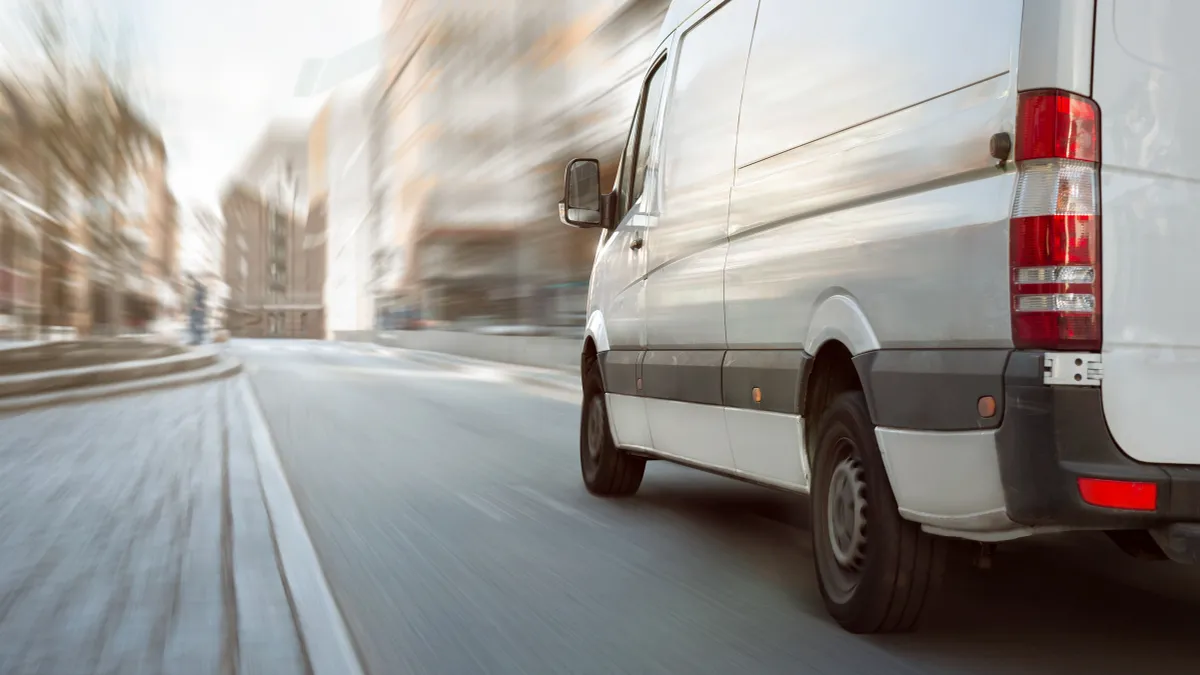Dive Brief:
- The city of Pittsburgh on Monday kicked off a year-long pilot program that will replace 20 existing loading areas with camera-enabled “smart” zones intended to address curb management challenges in the central business district and streamline the experience for delivery drivers.
- Pittsburgh received a $100,000 grant from Automotus, a curb management company partnering with the city, to begin the Smart Loading Zones program through the Department of Mobility and Infrastructure and the Pittsburgh Parking Authority.
- The revamped paid spaces are in part meant to address parking scarcity and traffic congestion that have impacted cities around the world as delivery services have grown.
Dive Insight:
For well over a decade, massive growth in home and commercial delivery has driven congestion on urban streets and increased air pollution from heightened vehicle emissions. It’s also created safety hazards, especially for delivery drivers. For example, in the Boston metro area, deliveries of online purchases surged more than 90% between 2010 and 2018. In the world’s top 100 cities, the World Economic Forum anticipates the presence of delivery vehicles on roads increasing by 36% by 2030 from 2019 levels.
But according to Gwendolyn Bolden, director of on-street and metered services with the Pittsburgh Parking Authority, parking has always been a challenge in her city, where narrow roads make finding curb access difficult, especially in commercial areas. That’s why at least half of the 20 smart loading spots will be in the central business district, with 10 more in outlying communities.
“Probably one of the biggest issues is [that] our loading zones are open to any vehicles,” said Bolden, noting smaller vehicles often take up the spots needed by large commercial vehicles. “So we're trying to provide parking for the consumer, for the business owner and then also for their delivery driver. It’s a lot going on in areas that weren't really designed for that many cars.”
Results from an Automotus survey released in February of 120 delivery drivers – a mix of independent and contracted workers – found fewer than one in 10 respondents were able to find a parking spot upon arrival, and 25% typically spend four to seven minutes looking for a parking spot. Another quarter said they parked in spots not meant for them if they couldn’t find an open parking spot. Almost 60% said once they found a spot, paying for parking through meters can add around two minutes to their delivery time.
Through a web-based app – not an app available on their phone – delivery drivers can register with their license plate and preferred payment source to use the smart loading zone spaces, where a pole-mounted camera will record their vehicle and then bill them for the paid parking spaces they’ve used. The parking rate is tiered: the first five minutes are billed at seven cents per minute, the next ten are billed at 14 cents, and so on. The spots are available 5 a.m. to 10 p.m. Monday through Friday.
“It encourages people to be more efficient with their business, conduct what they have to do, and then leave, knowing that the longer they delay, the more charges will occur,” said Anil Merchant, head of product at Automotus. The automated process also alleviates drivers from having to log into an app or pay a meter every time they pull up to the curb.
“The fundamental need here was to create a way to conveniently charge from the curb without disrupting the drivers’ core business,” said Merchant. “It doesn’t require the driver to get out of the car, or to fumble with their payment app every single time.”
If a driver doesn’t sign up for the app but still uses the parking spaces, that individual – or business, if they’re associated with a fleet system like USPS or Amazon – will be billed a slightly higher fee. The smart zones exist in previously paid parking slots, like metered parking spaces, so Automotus and the Pittsburgh Parking Authority said this is a streamlined parking fee, instead of an additional one.
“This is only our first attempt at looking at curbside management,” said Bolden. “We're always open and always looking for unique innovations to help the city manage those spaces.”
Pittsburgh’s goals include decreasing emissions from idling and circling; reducing parking-caused traffic by 20% and double-parking by 60%; and increasing parking turnover for small businesses. Bolden said Pittsburgh is also collecting data about how to structure the future curbside – like loading zones versus regular parking spaces, or paid or unpaid slots – based on utilization.
Automotus will use the Pittsburgh pilot to gather data for future launches in cities such as Omaha, Nebraska.
The curb management company is also using Pittsburgh’s data for a second project working to incentivize electric vehicle adoption. A $3.8 million grant issued by the Department of Energy in August 2021 to a Los Angeles-based team, including Automotus, represented first-of-its-kind funding by the federal government for curb management. Automotus will work with the Los Angeles Cleantech Incubator and others to reduce transportation emissions and accelerate zero-emissions vehicles, eventually bringing such programming back to cities like Pittsburgh.
Merchant said the Pittsburgh smart loading zone pilot would provide much of the information needed on electric vehicle usage to create baseline research for new zero-emissions programs. The company will use cameras at the smart zones to assess how many vehicles that park there are gas-powered versus electric, and whether that difference impacts length of stay.
Correction: A previous version of the article misstated the cities considering smart loading zone programs. They include Omaha, Nebraska.












